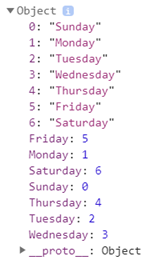
TypeScript introduces a lot of new language features that are common in statically typed languages, such as classes (which are now part of the JavaScript language), interfaces, generics and union types, to name a few.

But there’s one special type that we want to discuss today, and that is enums.
Enum, short for Enumerated Type, is a common language feature of many statically typed languages such as C, C#, Java, and Swift. It’s a group of named constant values that you can use within your code.
Let’s create an enum in TypeScript to represent the days of the week:
enum DayOfWeek {
Sunday,
Monday,
Tuesday,
Wednesday,
Thursday,
Friday,
Saturday
};
The enum is denoted using the enum keyword followed by the name of the enum (DayOfWeek). Then we define the constant values that we want to make available for the enum.
Now we can create a function to determine if it’s the weekend and have the argument that enum:
function isItTheWeekend(day: DayOfWeek) {
switch (day) {
case DayOfWeek.Sunday:
case DayOfWeek.Saturday:
return true;
default:
return false;
}
}
Finally, we can call it like so:
console.log(isItTheWeekend(DayOfWeek.Monday)); // logs 'false'
This is a nice way to remove the use of magic values within a codebase, since we have type-safe representation options that are all related to each other.
But things may not always be as they seem.
What do you think you get if you pass this through the TypeScript compiler?
console.log(isItTheWeekend(2)); // is this valid?
It might surprise you to know that this is valid TypeScript, and the compiler will happily take it for you.
The Replay is a weekly newsletter for dev and engineering leaders.
Delivered once a week, it's your curated guide to the most important conversations around frontend dev, emerging AI tools, and the state of modern software.
Writing this code may make you think that you’ve uncovered a bug in the TypeScript type system, but it turns out that this is intended behavior for this type of enum.
What we’ve done here is created a numeric enum, and if we look at the generated JavaScript it might be a bit clearer:
var DayOfWeek;
(function (DayOfWeek) {
DayOfWeek[DayOfWeek["Sunday"] = 0] = "Sunday";
DayOfWeek[DayOfWeek["Monday"] = 1] = "Monday";
DayOfWeek[DayOfWeek["Tuesday"] = 2] = "Tuesday";
DayOfWeek[DayOfWeek["Wednesday"] = 3] = "Wednesday";
DayOfWeek[DayOfWeek["Thursday"] = 4] = "Thursday";
DayOfWeek[DayOfWeek["Friday"] = 5] = "Friday";
DayOfWeek[DayOfWeek["Saturday"] = 6] = "Saturday";
})(DayOfWeek || (DayOfWeek = {}));
And if we output it to the console:

You’ll notice that the enum is really just a JavaScript object with properties under the hood.
It has the named properties we defined, and they are assigned a number representing the position in the enum that they exist (Sunday being 0, Saturday being 6), but the object also has number keys with a string value representing the named constant.
Therefore, we can pass in numbers to a function that expects an enum. The enum itself is both a number and a defined constant.
You might be thinking to yourself that this doesn’t seem particularly useful since it really breaks the whole type safe aspect of TypeScript if you can pass an arbitrary number to a function expecting an enum. So why is it useful?
Let’s say you have a service that returns a JSON payload when called, and you want to model a property of that service as an enum value.
In your database, you may have this value stored as a number. By defining it as a TypeScript enum, we can cast it properly:
const day: DayOfWeek = 3;
This explicit cast that’s being done during assignment will turn the day variable from a number to our enum, meaning that we can get a bit more of an understanding of what it represents when it’s being passed around our codebase.
Since an enum’s member’s number is defined based on the order in which they appear in the enum definition it can be a little opaque as to what the value will be until you inspect the generated code, but that’s something we can control:
enum FileState {
Read = 1,
Write = 2
}
Here’s a new enum that models the state a file could be in.
It could be in read or write mode, and we’ve explicitly defined the value that corresponds with that mode (I’ve just made up these values, but it could be something coming from our file system).
Now it is clear what values are valid for this enum, as we’ve done that explicitly.
But there’s another reason that this can be useful, and that’s for using enums for bit flags.
Let’s take our FileState enum from above and add a new state for the file, ReadWrite:
enum FileState {
Read = 1,
Write = 2,
ReadWrite = 3
}
Then — assuming we have a function that takes the enum — we can write code like this:
const file = await getFile("/path/to/file", FileState.Read | FileState.Write);
Note that we’re using the | operator on the FileState enum.
This allows us to perform a bitwise operation on them to create a new enum value — in this case it’ll create 3, which is the value of the ReadWrite state.
In fact, we can write this in a clearer way:
enum FileState {
Read = 1,
Write = 2,
ReadWrite = Read | Write
}
Now the ReadWrite member isn’t a hand-coded constant: it’s clear that it’s made up as a bitwise operation of other members of the enum.
We do have to be careful with using enums this way, though.
Take the following enum:
enum Foo {
A = 1,
B = 2,
C = 3,
D = 4,
E = 5
}
If we were to receive the enum value E (or 5), is that the result of a bitwise operation of Foo.A | Foo.D or Foo.B | Foo.C?
So, if there’s an expectation that we are using bitwise enums like this, we want to ensure that it will be really obvious how we arrived at that value.
We’ve seen that an enum will have a numeric value assigned to it by default, or we can explicitly do it on all of them.
In addition to that, we can also do it on a subset of them:
enum DayOfWeek {
Sunday,
Monday,
Tuesday,
Wednesday = 10,
Thursday,
Friday,
Saturday
}
Here, we’ve specified that the value of 10 will represent Wednesday, but everything else will be left as is.
So, what does that generate in JavaScript?
var DayOfWeek;
(function (DayOfWeek) {
DayOfWeek[DayOfWeek["Sunday"] = 0] = "Sunday";
DayOfWeek[DayOfWeek["Monday"] = 1] = "Monday";
DayOfWeek[DayOfWeek["Tuesday"] = 2] = "Tuesday";
DayOfWeek[DayOfWeek["Wednesday"] = 10] = "Wednesday";
DayOfWeek[DayOfWeek["Thursday"] = 11] = "Thursday";
DayOfWeek[DayOfWeek["Friday"] = 12] = "Friday";
DayOfWeek[DayOfWeek["Saturday"] = 13] = "Saturday";
})(DayOfWeek || (DayOfWeek = {}));
Initially, the values are defined using their position in the index with Sunday through Tuesday being 0 to 2.
Then, when we reset the order at Wednesday, everything after that is incremented from the new starting position.
This can become problematic if we were to do something like this:
enum DayOfWeek {
Sunday,
Monday,
Tuesday,
Wednesday = 10,
Thursday = 2,
Friday,
Saturday
}
We’ve made Thursday 2, so what does our generated JavaScript look like?
var DayOfWeek;
(function (DayOfWeek) {
DayOfWeek[DayOfWeek["Sunday"] = 0] = "Sunday";
DayOfWeek[DayOfWeek["Monday"] = 1] = "Monday";
DayOfWeek[DayOfWeek["Tuesday"] = 2] = "Tuesday";
DayOfWeek[DayOfWeek["Wednesday"] = 10] = "Wednesday";
DayOfWeek[DayOfWeek["Thursday"] = 2] = "Thursday";
DayOfWeek[DayOfWeek["Friday"] = 3] = "Friday";
DayOfWeek[DayOfWeek["Saturday"] = 4] = "Saturday";
})(DayOfWeek || (DayOfWeek = {}));
Uh oh, looks like there might be an issue: 2 is both Tuesday and Thursday!
If this was a value coming from a data source of some sort, we’d have some ambiguity in our application.
So, if we are going to be setting value, it’s better to set all of the values so that it is obvious what they are.
So far, we’ve only discussed enums that are numeric or explicitly assigning numbers to enum values, but an enum doesn’t have to be a number value — it can be any constant or computed value:
enum DayOfWeek {
Sunday = "Sun",
Monday = "Mon",
Tuesday = "Tues",
Wednesday = "Wed",
Thursday = "Thurs",
Friday = "Fri",
Saturday = "Sat"
}
Here we’ve made a string enum, and the generated code is a lot different:
var DayOfWeek;
(function (DayOfWeek) {
DayOfWeek["Sunday"] = "Sun";
DayOfWeek["Monday"] = "Mon";
DayOfWeek["Tuesday"] = "Tues";
DayOfWeek["Wednesday"] = "Wed";
DayOfWeek["Thursday"] = "Thurs";
DayOfWeek["Friday"] = "Fri";
DayOfWeek["Saturday"] = "Sat";
})(DayOfWeek || (DayOfWeek = {}));
Now we’ll no longer be able to pass in a number to the isItTheWeekend function, since the enum is not numeric. However, we also can’t pass in an arbitrary string, since the enum knows what string values are valid.
This does introduce another issue though — we can no longer do this:
const day: DayOfWeek = "Mon";
The string isn’t directly assignable to the enum type. Instead, we have to do an explicit cast:
const day = "Mon" as DayOfWeek;
This can have an impact on how we consume values that are to be used as an enum.
But why stop at strings? In fact, we can mix and match the values of enums within an enum itself:
enum Confusing {
A,
B = 1,
C = 1 << 8,
D = 1 + 2,
E = "Hello World".length
}
Provided that all assignable values are of the same type (numeric in this case,) we can generate those numbers in a bunch of different ways, including computed values. If they are all constants, we can mix types to make a heterogeneous enum:
enum MoreConfusion {
A,
B = 2,
C = "C"
}
This is quite confusing and can make it difficult to understand how the data works behind the enum. As a result, it’s recommended that you don’t use heterogeneous enums unless you’re really sure it’s what you need.
Enums in TypeScript are a very useful addition to the JavaScript language when used properly.
They can help make it clear the intent of normally “magic values” (strings or numbers) that may exist in an application and give a type-safe view of them.
But like any tool in one’s toolbox, if they are used incorrectly, it can become unclear what they represent and how they should be used.

LogRocket lets you replay user sessions, eliminating guesswork by showing exactly what users experienced. It captures console logs, errors, network requests, and pixel-perfect DOM recordings — compatible with all frameworks, and with plugins to log additional context from Redux, Vuex, and @ngrx/store.
With Galileo AI, you can instantly identify and explain user struggles with automated monitoring of your entire product experience.
Modernize how you understand your web and mobile apps — start monitoring for free.

React Server Components and the Next.js App Router enable streaming and smaller client bundles, but only when used correctly. This article explores six common mistakes that block streaming, bloat hydration, and create stale UI in production.

Gil Fink (SparXis CEO) joins PodRocket to break down today’s most common web rendering patterns: SSR, CSR, static rednering, and islands/resumability.

@container scroll-state: Replace JS scroll listeners nowCSS @container scroll-state lets you build sticky headers, snapping carousels, and scroll indicators without JavaScript. Here’s how to replace scroll listeners with clean, declarative state queries.

Explore 10 Web APIs that replace common JavaScript libraries and reduce npm dependencies, bundle size, and performance overhead.
Hey there, want to help make our blog better?
Join LogRocket’s Content Advisory Board. You’ll help inform the type of content we create and get access to exclusive meetups, social accreditation, and swag.
Sign up now
2 Replies to "Why TypeScript enums suck"
What are your thoughts on using unions with type level strings instead?
I’d prefer them over enums every single time. They cover all the regular cases for enums, and the ones they don’t cover, there you shouldn’t use enums either. I’m talking about doing math with enums.
Wether it’s bit-flags or stuff like `if(day < DaysOfWeek.Saturday)…`.
Additionally they are nice and readable when I have to deal with JSON or a Database. When I'm greeted by the day "Monday", "Tuesday", "Wednesday" instead of 1,2,3.
And if someone now thinks, counting down the days of the week is trivial, tell me: what's the first value in your enum? 1? Or did you start at 0 so that the values double as indices over an array of localized strings? And what is the first Entry? Sunday or Monday? You wrote Sunday, in my area that's the last day of the week. And all that just with something as "trivial" as days of week. Now imagine a somewhat more abstract collection of options and you tell me which numeric value translates to what readable option in that enum.